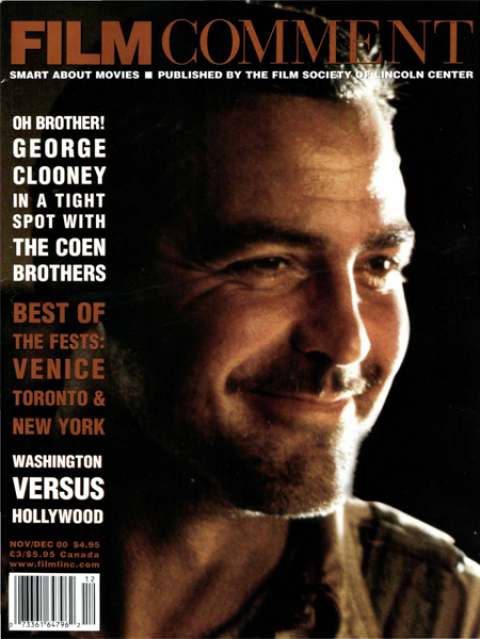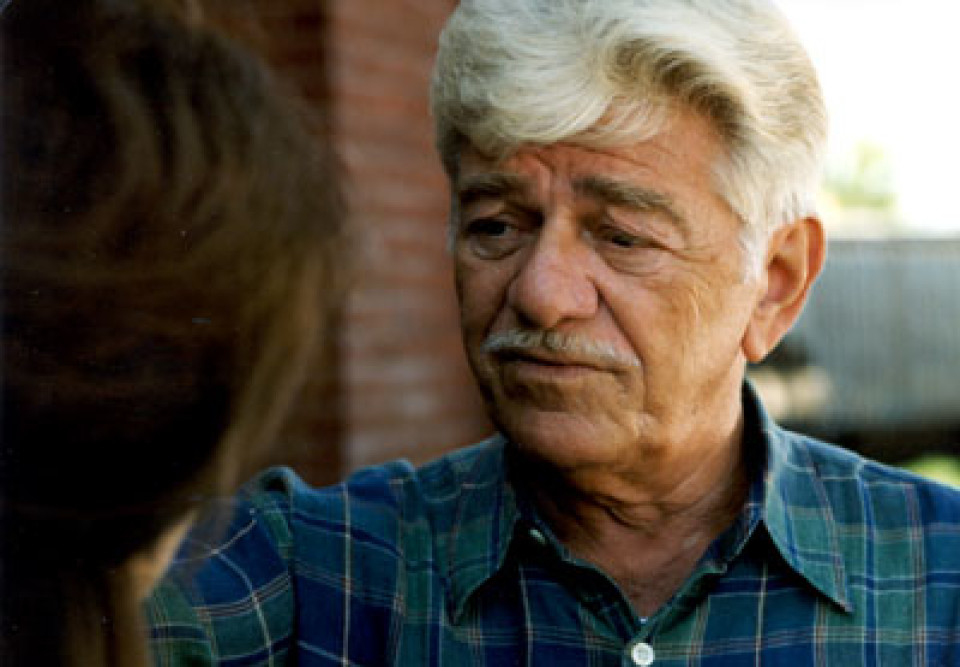By Kent Jones in the November-December 2000 Issue

First Look: Sleepy Time Gal
As a title, Sleepy Time Gal is defiantly unfashionable. But given the fact that it's the title of a Chris Münch film, it's unsurprising. This is an artist who likes to get stuck in forgotten, wayward moments: John Lennon and Brian Epstein's weekend in Barcelona; a doomed attempt to revive the railroad line through Yosemite. The relationship with the past is worn more lightly in the new film than in the stunning yet flawed Color of a Brisk and Leaping Day (another grabber of a title). As usual, Münch is chasing down something exceedingly delicate. Distances across time are linked to distances in space, and characters are dispersed both emotionally and geographically, but it's all handled softly, without emphatic prodding. The final effect of Sleepy Time Gal is of a lovingly crafted patchwork quilt, sewn by hand, billowing as it falls over the bed.

From the November-December 2000 Issue
Also in this issue
In fact, there’s a nice moment where Betty (Peggy Gormley), a woman with a bountiful smile and a lovely mass of tangled, frizzy hair, prescribes quilting to Jacqueline Bisset’s Frances as a path to inner peace. The emotional tone is very precise: two middle-aged women, respective wife and former mistress of a well-loved man, sitting on the bed of a comfy, low-ceilinged room at the end of a sunny fall day, in an atmosphere of homey comfort. The unspoken rivalry between the goodly wife Betty and the more unsettled Frances dissolves into the warmth of instant rapport. The talk gets a little too declarative, less genuinely conversational than it might be, as it does in a lot of Sleepy Time Gal. But that’s a small defect in the face of so many exemplary virtues, not the least of which is a firm grasp of where people are at in their lives at any given moment, how they measure themselves against their own ideal self-images, how their unfulfilled needs and desires plague their lives. A scene or two later, Frances goes up for a balloon ride with Bob, her old beau (and Betty’s husband), who is played by Seymour Cassel. As he does throughout the movie, Münch drops us into the moment without a setup. One moment is linked to the next without an immediately clear reason, which gives the gentle images a poetic lilt ö in fact, this is a movie that comes alive through its transitions. It’s only later that you understand this moment in the balloon as elegiac, a subtle foreshadowing of two lives coming to an end before either has been fulfilled.
Sleepy Time Gal is about searching, trying to complete one’s self, not as a quest but as a biological urge. Frances, who’s dying of cancer, suddenly feels the need to see the baby girl she gave up for adoption long ago ö she wants her to materialize. Rebecca (Martha Plimpton), a grown woman with an Ivy League affect and a sharp business sense that she wears like a shell, leaves New York to visit her adoptive parents in Boston and then travels to Baton Rouge to preside over the acquisition of a small radio station. Bob (Cassel) wants to make himself whole by reuniting with Frances, reincorporating himself into her life. Münch lets his three principal characters slowly achieve a painful insight: the past never dies, but it’s never to be repeated.

This is a film of subtle sensations. When Rebecca goes to Baton Rouge to oversee the takeover of the station, she improbably allows herself to be seduced by the one-time owner, super-suave ladies’ man Jimmy (Frankie Faison). The keynote emotion is Plimpton’s bemusement, her quick recognition of the absurdity of this one-night stand even as she gives in to it. There’s also a very good, tough moment where Bisset only barely endures the prying inquisitions of her mother when she visits her in a nursing home. Her voice rises in anger with every attempt at a defensively polite answer, until she has to leave the room and vomit. And the stricken look on Cassel’s face once he realizes that Bisset has gone is indelible: completely in the moment, unhighlighted, and candidly awkward. He gets directly at the essense of an old, revered academic as his self-respect momentarily crumbles. It’s quiet, unadorned moments like this that make up the movie.
Münch’s sense of place ö just barely glimpsed but always ultra-specific ö rises and falls with his actors, on whom he leans heavily to keep all the disparate strands together. (If you look at any given scene from this film on its own, it seems disconnected, wayward ö it only works as one complete entity.) If acting was the major problem with Color of a Brisk and Leaping Day, it’s the strong suit here. Plimpton lays the cultivated Bostonian act on a mite too aggressively, a little like a runner jumping the gun. But somehow the awkwardness in her vocal attack makes her character appealingly vulnerable (miraculously, she actually looks like she could have been produced by the union of Bisset and Cassel). Cassel acts in the muted register that worked so well for him in Rushmore, which suits him better as an actor than the manic extroversion of his youth. Here he gives us both aging dignity and the romantic foolishness beneath its surface. Gormley makes something wonderful out of her brief appearance, inscribing a whole biography into the role with her commanding warmth, quietness, and contentment. There’s also a cunning performance by Nick Stahl as Morgan, Frances’ son. The young actor, a dead ringer for the director, plays a character who stands apart from most interactions, full of youthful superiority and arrogance that mask a genuine curiosity about people. It may not be the most nuanced performance, but the tone of calm, removed disdain is perfect.
If there’s one actor who holds this dangerously delicate movie together, it’s Bisset. In many ways, the film hinges on her character’s peculiar discomfort, her rethink of her image as a bewitching, intelligent adventuress, her wanderlust vying for supremacy with her pride and fierce sense of conviction (“You should be taking a picture of this,” she barks at Morgan near the beginning of the film, as they gaze up at the George Washington Bridge.)
Münch never gets a purchase on the ethos of the Sleepy Time Gal (Bisset’s late-night DJ moniker from her Baton Rouge days), who supposedly left a path of devastated men in her wake way back when. But he and his star have a lock on Frances’ middle-aged upset, her slowly dawning realization that she’s always longed for this daughter she never knew. Bisset’s is not a very mobile performance, but she’s very good at states of mind and internal convulsions: reverie, mounting self-disgust, and most impressive of all, a slowly building image in her character’s mind of the hole left in her life by the baby she gave up. She has just the right toughness of a worldly woman trying to burn intelligence into her children but who’s never satisfied with herself, and she and her young director handle the harrowing cancer scenes perfectly: nicely modulated, without bravura effects.
Delicate to the point of being diaphanous, Sleepy Time Gal has its weaknesses: Münch seems uncertain about precisely where Morgan fits into the story, and his ear for dialogue falters from time to time. But his sense of emotions as they play out in everyday life is pitch-perfect. And he ends Sleepy Time Gal beautifully, in a state of equilibrium rather than reconciliation, of wholeness rather than happiness.







